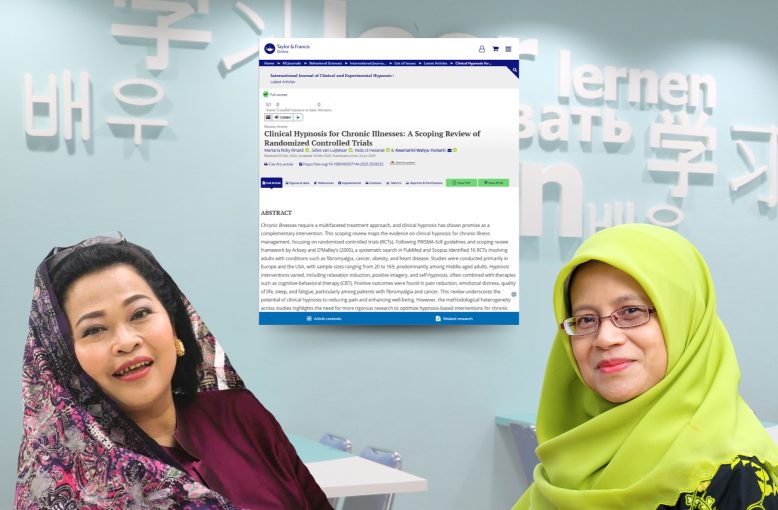
Yogyakarta, July 30, 2025 – Martaria Rizky Rinaldi, Prof. Gilles van Luijtelaar, Dr. Nida Ul Hasanat, M.Si., Psikolog, and Prof. Dra. Kwartarini Wahyu Yuniarti, M.Med.Sc., Ph.D., Psikolog have successfully published their research titled “Clinical Hypnosis for Chronic Illnesses: A Scoping Review of Randomized Controlled Trials” in the International Journal of Clinical and Experimental, a reputable Scopus-indexed international journal (Q2) with a 2024 SJR of 0.677 and an Impact Factor (IF) of 2.4.
This study aimed to map the research landscape on the use of clinical hypnosis in populations with chronic illnesses, including—but not limited to—persistent pain, irritable bowel syndrome, and cancer. Clinical hypnosis is considered a promising psychological intervention to modify pain perception, reduce anxiety, and manage fatigue through structured suggestion and psychophysiological regulation. The mapping sought to identify key variables, theoretical mechanisms, and conceptual frameworks underlying the effectiveness of clinical hypnosis in chronic illness management. This review is expected to serve as a conceptual and methodological foundation for future research that empirically tests the effectiveness of clinical hypnosis interventions in improving the quality of life of individuals with long-term medical conditions.
This research represents the commitment of the UGM Faculty of Psychology to support the achievement of Sustainable Development Goal (SDG) 3: Good Health and Well-being through the exploration of innovative scientific approaches that bridge mental and physical health. Furthermore, the study is part of the faculty’s academic internationalization efforts through collaborative research and joint supervision with the Donders Centre for Cognition, Radboud University, Nijmegen, the Netherlands.
Below are the abstract, keywords, and link to the article:
Abstract. Chronic illnesses require a multifaceted treatment approach, and clinical hypnosis has shown promise as a complementary intervention. This scoping review maps the evidence on clinical hypnosis for chronic illness management, focusing on randomized controlled trials (RCTs). Following PRISMA-ScR guidelines and scoping review framework by Arksey and O’Malley (2005), a systematic search in PubMed and Scopus identified 16 RCTs involving adults with conditions such as fibromyalgia, cancer, obesity, and heart disease. Studies were conducted primarily in Europe and the USA, with sample sizes ranging from 20 to 169, predominantly among middle-aged adults. Hypnosis interventions varied, including relaxation induction, positive imagery, and self-hypnosis, often combined with therapies such as cognitive-behavioral therapy (CBT). Positive outcomes were found in pain reduction, emotional distress, quality of life, sleep, and fatigue, particularly among patients with fibromyalgia and cancer. This review underscores the potential of clinical hypnosis to reducing pain and enhancing well-being. However, the methodological heterogeneity across studies highlights the need for more rigorous research to optimize hypnosis-based interventions for chronic conditions.
Keywords: Chronic illness; clinical hypnosis; randomized controlled trials
The publication can be accessed at:
🔗 https://www.tandfonline.com/doi/full/10.1080/00207144.2025.2528232
Based on its keywords, this article is an output focusing on SDG 3.
Congratulations to Prof. Kwartarini, Dr. Nida, and the research team!
Writer: Fauzi
Editor: Zufar
